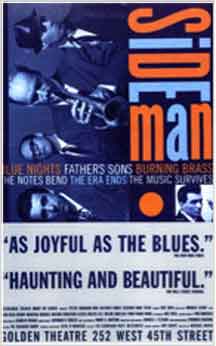
The first half of the pallid 1998-99 Broadway season clogged the stages with such negligible entertainments as Getting and Spending and The Blue Room. Part two offered a slew of revivals and British plays. Now we have to step back and recall fondly that the very first play of last season -- a new American drama by Warren Leight -- is the altogether touching and marvelous Side Man. Sweetness, humor and a loving respect for jazz music keep Leight's Tony-winning play from being another dreary, kitchen-sink look at a poor family whose mad mother despairs and whose dad might as well hang a "vacancy" sign on his forehead. Instead, Side Man is both a very funny, and a very, very sad look at lives in decline.
Terry, the mother (Angelica Torn) goes from foul-mouthed but virginal newlywed to manic, alcoholic shrew. Father Gene's mellow self-confidence eventually renders him a zombie, coming alive only when he blows his trumpet. Just as important are the side men who play with Gene, all of whom live from paycheck to paycheck (and take great pride in their "work ethic" -- each week without fail, they wait on a line to collect unemployment benefits), all of whom sacrifice a more comfortable life for the music to which they're addicted.
First ensconced at the CSC space downtown, Side Man then had the feel of something intimate, lived-in. Now, in a commercial run at Broadway's John Golden Theater, the play has to behave more like a Show. Therefore, early scenes find the audience forcing itself to laugh too hard at quiet jokes, while a great later scene, in which the four aging musicians listen to a tape made on the last night of a fallen comrade, proves less moving now that the music is played over the loudspeakers rather than from what truly sounds like a homemade audio cassette. These commercial concessions aside, the work as a whole is even more melancholy now, with Angelica Torn in some ways an improvement over her fine predecessor, Edie Falco, in that Terry's descent now feels more modulated and inevitable.
(Two things that don't convince: her middle-aged makeup, and her talking-a-blue-streak jags that sound like a riff for the audience rather than an amusing-but-troubling character trait.)
Kevin Geer continues to give one of the season's most memorable performances as Jonesy, a jazzman sadly robbed of his greatness. A special nod, too, to Brian MacDevitt's lighting, which heightens the moods and mood-changes of each scene.
